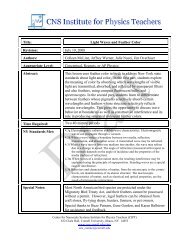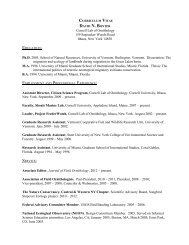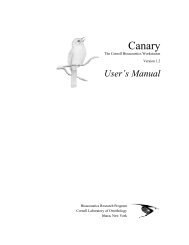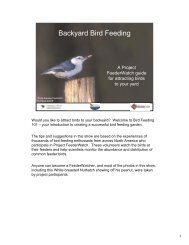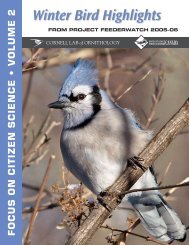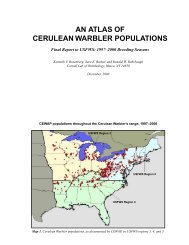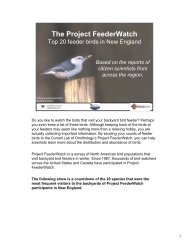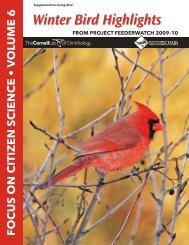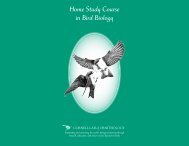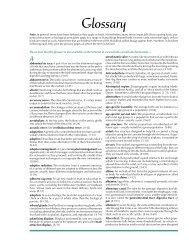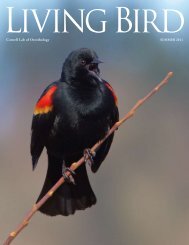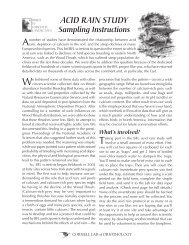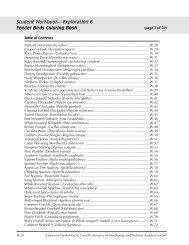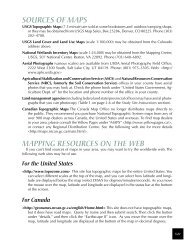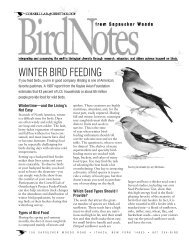Urban Bird Gardens Final Report - Cornell Lab of Ornithology ...
Urban Bird Gardens Final Report - Cornell Lab of Ornithology ...
Urban Bird Gardens Final Report - Cornell Lab of Ornithology ...
You also want an ePaper? Increase the reach of your titles
YUMPU automatically turns print PDFs into web optimized ePapers that Google loves.
Conclusions and Implications<br />
their lives, and certainly a big part<br />
<strong>of</strong> their leisure. Technology use by<br />
parents, on the other hand, was<br />
much more mixed. If a program<br />
includes a significant technology<br />
component, it will be important to<br />
address age-related age related differences in<br />
familiarity and comfort with<br />
technology. Adults, however, did<br />
recognize the value <strong>of</strong> technology. It<br />
may be that the right type <strong>of</strong> project<br />
may actually encourage adults to<br />
use technology. Cell phones and<br />
digital g cameras are readily y<br />
accessible technology to members <strong>of</strong><br />
the Latino communities in this<br />
study.<br />
There may be opportunities to<br />
leverage the social networking that<br />
youth find so important. For<br />
example, a project linking youth<br />
from different parts <strong>of</strong> the U.S., or<br />
even different countries, as part <strong>of</strong> a<br />
broad informal science initiative may<br />
have high appeal and could present<br />
interesting opportunities to share<br />
data and experiences around<br />
science.<br />
Science<br />
The generally positive perceptions <strong>of</strong><br />
science, particularly among adults,<br />
suggest there are opportunities to<br />
engage thi this audience di i in citizen iti<br />
science projects. Adult participants,<br />
especially, saw science as a valuable<br />
field that makes significant<br />
contributions to society. Both adults<br />
and youth viewed science as a<br />
somewhat dynamic discipline<br />
centering on experimentation,<br />
discovery, and invention.<br />
These aspects seemed to many<br />
respondents to be the most exciting<br />
aspects <strong>of</strong> science. Yet participants<br />
did not necessarily associate science<br />
with field work or research outside a<br />
laboratory. Programs like UBG can<br />
clearly y help p expand p both adult’s and<br />
youth’s understandings <strong>of</strong> science<br />
and scientific research.<br />
It is also possible that engaging<br />
these youth in informal science<br />
activities, and providing them with a<br />
different way <strong>of</strong> “doing” science than<br />
what they currently experience in<br />
school, may expand their notions <strong>of</strong><br />
science and, potentially, in identitybuilding<br />
endeavors where they see<br />
themselves as engaging in scientific<br />
inquiry.<br />
The Environment and Citizen<br />
Science<br />
Adult participants did, in fact, see<br />
themselves as potential participants<br />
in citizen science projects. They not<br />
only saw the value <strong>of</strong> citizen science<br />
t to society, i t bbut t also l easily il id identified tifi d<br />
potential personal benefits. An<br />
opportunity clearly exists to engage<br />
this audience in projects focusing on<br />
public participation in research. It is<br />
important to note, however, that<br />
respondents also expressed a<br />
reluctance to participate, particularly<br />
because <strong>of</strong> their education levels.<br />
Any project developed to serve this<br />
audience, therefore, will need to:<br />
a) take into consideration literacy<br />
and other issues related to<br />
educational levels;<br />
b) help participants become<br />
comfortable with their roles and<br />
with data collection;<br />
c) c) potentially provide participants<br />
with more “basics” about how<br />
citizen science works than what is<br />
provided to more “mainstream”<br />
audiences already participating in<br />
citizen science; and<br />
d) d) Provide more support early in<br />
the process than for other citizen<br />
science projects.<br />
Participants’ Participants concern for the<br />
environment can clearly serve as an<br />
entry-point in engaging Latino<br />
communities with citizen science,<br />
particularly if a connection is clearly<br />
communicated between the<br />
activities in which they are engaged<br />
and the potential p contributions <strong>of</strong><br />
such activities to scientific learning<br />
and environmental issues.<br />
Garibay Group │ <strong>Urban</strong> <strong>Bird</strong> <strong>Gardens</strong> Front-end Evaluation │ Summer 2009 30



